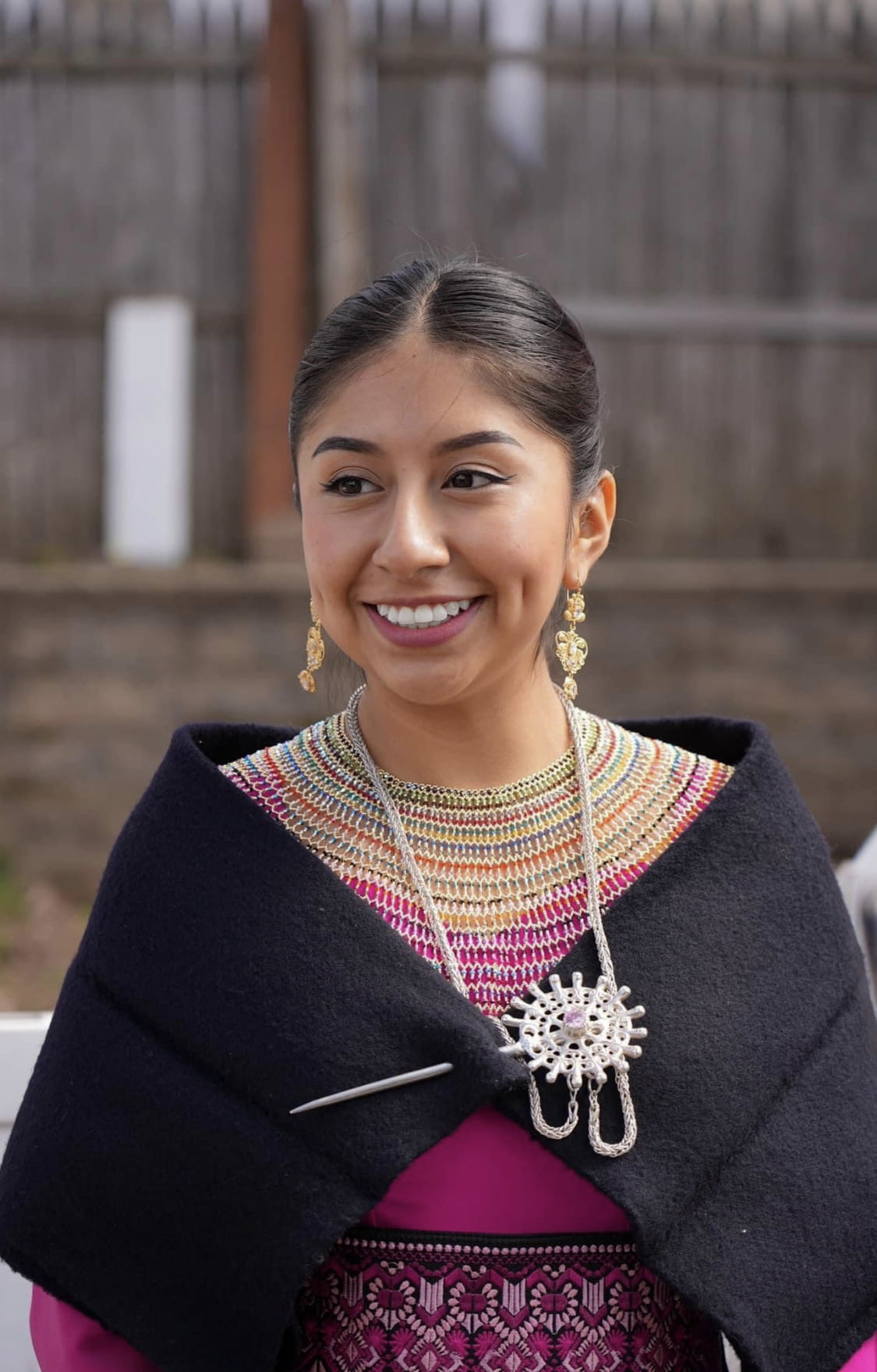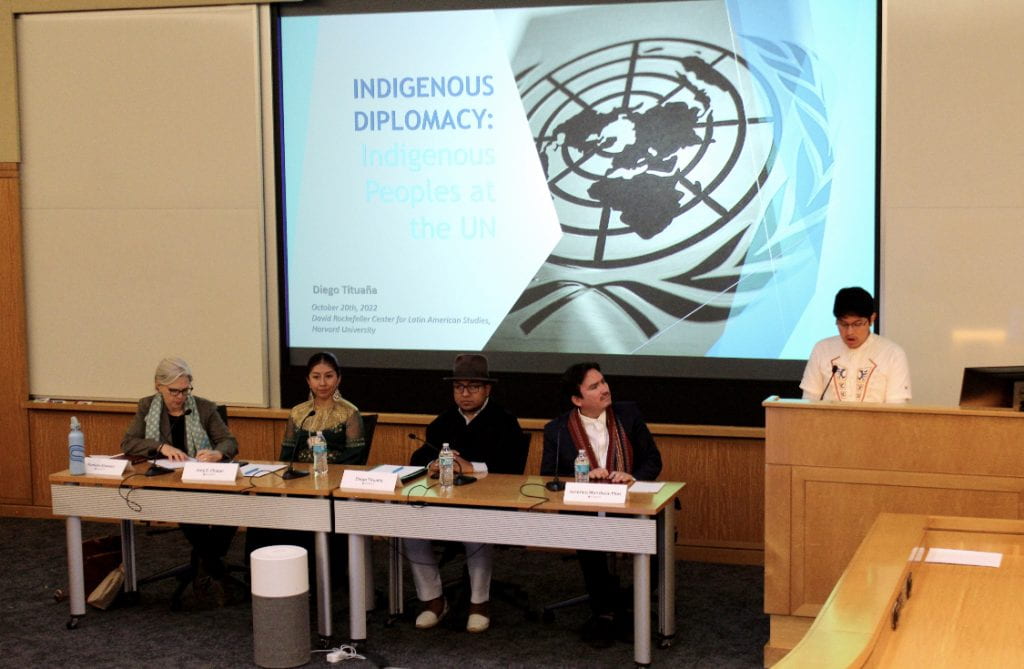
About the Author
Amy E. Chalán is a Kichwa Saraguro student at Harvard College. She wishes to thank Diego, Profe. Américo, Prof. Pamela, and everyone who made this event possible!
Indigenous Kichwa Presence at Harvard
Kichwa Otavalo diplomat Diego Tituaña visited Harvard University to discuss the promotion and protection of indigenous peoples rights at global platforms, with the goal of strengthening identity & traditional knowledge.
During the fall 2022 semester, I was invited to participate in hosting Kichwa Otavalo diplomat Diego Tituaña at Harvard for a discussion of global indigeneity at the United Nations. Besides my general excitement to share a platform with incredible scholars dedicated to the protection of Indigenous rights, I felt profoundly energized by the opportunity to meet an indigenous Kichwa relative and role model. I first met Diego when he visited Professor Américo Mendoza-Mori’s class (EMR151: Quechua, Indigenous language revitalization and Global Indigeneity) to share his experience working on Indigenous peoples rights at the UN. Diego’s openness about the visibility, role and experience of indigenous voices at a global platform captured the attention of all students in the room, who had recently engaged with reflections written by Kankana-eyleader and former UN Special Rapporteur on the rights of indigenous peoples, Victoria Tauli-Corpuz.
The next day, along with Professor Pamela Klassen, I participated as a commentator for Diego’s event on Indigenous Diplomacy at the David Rockefeller Center for Latin American Studies and felt motivated to wear my traditional clothing for the first time at Harvard. As a Kichwa Saraguro woman who grew up in the diaspora, I haven’t encountered many opportunities or spaces, outside of my Indigenous community, to showcase my heritage, let alone with a Kichwa role model in the room!
Pictured (Left to right): Dr. Pamela Klassen (William Lyon MacKenzie King Visiting Professor of Canadian Studies at Harvard University), Amy E Chalán (Kichwa Saraguro student), Diego Tituaña (Kichwa Otavalo diplomat), Américo Mendoza-Mori (Lecturer in Ethnicity, Migration, & Rights).
It was incredibly affirming to proudly wear my Saraguroclothing next to Diego, also dressed in Kichwa Otavalo vestment, and share my reaction to his presentation. In my four years at Harvard, this day stands out as a momentous occasion, in which my perspective as an indigenous wambra (youth)changed significantly as I was inspired by Diego’s suggestions for the future of Indigenous rights at the intersection between academia, grassroots activism and global concerns.
At an intimate dinner with Diego, Profe. Américo and a few other students, I spoke to Diego about my involvement in my transnational community, as Reina SarUSA. This day inspired me to take the initiative of wearing my Indigenous clothing to class once a week, which I share with my community through social media, and to begin a cultural consciousness program for Kichwa youth. I hope to carry forward these reflections and pride I feel for my Kichwa Saraguro heritage as I continue to pay it forward and share my experiences with other Kichwa and Indigenous youth.
More Student Views
Puerto Rico’s Act 60: More Than Economics, a Human Rights Issue
For my senior research analysis project, I chose to examine Puerto Rico’s Act 60 policy. To gain a personal perspective on its impact, I interviewed Nyia Chusan, a Puerto Rican graduate student at Virginia Commonwealth University, who shared her experiences of how gentrification has changed her island:
Beyond Presence: Building Kichwa Community at Harvard
I recently had the pleasure of reuniting with Américo Mendoza-Mori, current assistant professor at St Olaf’s College, at my current institution and alma mater, the University of Wisconsin-Madison. Professor Mendoza-Mori, who was invited to Madison by the university’s Latin American, Caribbean, and Iberian Studies Program, shared how Indigenous languages and knowledges can reshape the ways universities teach, research and engage with communities, both local and abroad.
Of Salamanders and Spirits
I probably could’ve chosen a better day to visit the CIIDIR-IPN for the first time. It was the last week of September and the city had come to a full stop. Citizens barricaded the streets with tarps and plastic chairs, and protest banners covered the walls of the Edificio de Gobierno del Estado de Oaxaca, all demanding fair wages for the state’s educators. It was my first (but certainly not my last) encounter with the fierce political activism that Oaxaca is known for.




